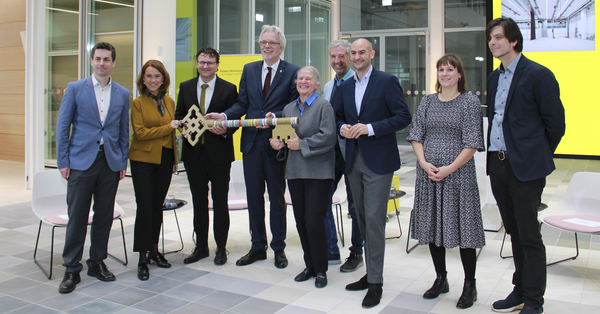Go-ahead for Cyber Valley
Science and industry form one of Europe's largest research partnerships in artificial intelligence

"Cyber Valley will be a place where the technological foundations for our digital future will be laid", says Martin Stratmann. "We not only want to be a magnet and a talent factory for the best junior scientists, we also want to create space for dialogue with people. After all, the digital future affects us all."
In Cyber Valley, the Max Planck Institute for Intelligent Systems, the State of Baden-Württemberg, the universities of Stuttgart and Tübingen, together with Bosch, Daimler, Porsche, BMW, ZF Friedrichshafen and Facebook are working together to boost research and development in artificial intelligence. The result is one of the largest research partnerships in Europe in the area of artificial intelligence. The State will invest more than EUR 50 million in the initiative in the coming years.
A cycle of perception, understanding, action and learning
The intelligent systems that will be researched and developed in Cyber Valley will be capable of completing the cycle of perception, understanding, action and learning. This ability, which humans and animals master as a matter of course, is vital in being able to act independently in complex and dynamic environments. The aim of the research cluster is to learn from nature and to understand the underlying regulatory and control mechanisms of perception, action and learning and to reproduce them in artificial systems.
"A distant vision for so long, this is now within our reach: artificial intelligence is on the way", says Minister-President Winfried Kretschmann. "We are convinced that the establishment of Cyber Valley here in Baden-Württemberg can lead to the development of a hub for scientific excellence involving the brightest minds of tomorrow in the area of artificial intelligence. Our goal is not only to build the best machines but also the cleverest machines."
Cyber Valley is designed to be more than an international centre for researching intelligent systems: its aim is also to promote company startups in this area in order to move as quickly as possible from basic research to marketable applications. A key element of the project will be the training of up to 100 doctoral students.
New Research Groups and professorships
As a first step, nine and later five Cyber Valley Research Groups will be set up. These will be funded by the State, the core partners and a consortium of foundations in Baden-Württemberg. Ten professorships at the universities of Stuttgart and Tübingen will also lend additional weight to Cyber Valley in an international context: the universities will each host two professorships as 'bridging professors' with the Max Planck Institute for Intelligent Systems and thus will make a significant and long-term contribution to the initiative. The State will supplement these efforts by financing two additional professorships in each case. The companies are also committed to the establishment of a total of two Endowment Chairs in Stuttgart and Tübingen. In summer 2017, the Max Planck Institute for Intelligent Systems and the universities of Stuttgart and Tübingen will set up a joint graduate school (International Max Planck Research School - Intelligent Systems). In a second development phase, the State will use special funding to support a shared new building project that will be the physical centre of Cyber Valley.
"Thanks to their various areas of research, the universities of Stuttgart and Tübingen form the ideal interface between humans and machines", says Theresia Bauer, Minister of Science, Research and the Arts. "The partnership with the Max Planck Institute is an excellent opportunity to light a beacon for science in the area of AI in Baden-Württemberg."
Director of the Perceiving Systems Department at the Max Planck Institute for Intelligent Systems
Related Articles

School pupils compete in the Federal Competition for Arti...



